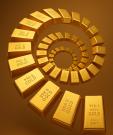The Upward Momentum In Gold Prices Looks Set To Continue
Gold prices climbed back above the $1,400 an ounce on Tuesday after Interfax reported that Russia detected a missile launch. A Russian Defense Ministry spokesman quoted by the Interfax news agency said the launch was picked up by an early warning radar station at Armavir, near the Black Sea, which is designed to detect missiles from Europe and Iran.
RIA, another Russian news agency, later quoted a source in Syria's "state structures" as saying the objects had fallen harmlessly into the sea.
The Russian Defence Ministry declined comment to Reuters.
However, later in the day Israel's Defense Ministry said that it, along with a Pentagon team, had carried out a test-launch of a Sparrow missile. The Sparrow, which simulates the long-range missiles of Syria and Iran, is used for target practice by Israel's U.S.-backed ballistic shield Arrow.
"Israel routinely fires missiles or drones off its shores to test its own ballistic defence capabilities," a U.S. official said in Washington.
Western naval forces have been gathering in the Mediterranean and the Red Sea since President Bashar al-Assad was accused of carrying out an August 21 gas attack in his more than two-year-old conflict with rebels trying to topple him.
Moscow is Assad's big-power ally and has mobilised its own navy in the face of U.S. military preparations to punish the Syrian government for its alleged killing of more than 1,400 people in the chemical strike in an embattled Damascus suburb.
Russia opposes any outside military intervention in Syria's civil war and says it suspects the gassings were staged by rebels seeking foreign involvement in the conflict.
The news caused a spike in gold prices which later dropped back below $1400 an ounce only to rise again during the second London gold fix.
In South Africa, more than 120,000 unionized gold miners In South Africa, represented by the National Union of Mineworkers (NUM), are set to go on strike as of today. Yesterday, Reuters reported that South African union leaders warned that mine owners' handling of pay talks could provoke violence, and bosses said wage hikes would force mine closures and cost thousands of jobs.
Mining companies have already explained that they cannot afford to agree to the demands made by the unions due to soaring costs and depressed prices. The president of South Africa's Chamber of Mines warned unions against stoking workers' hopes.
Mark Cutifani, who is also chief executive of mining giant Anglo American said, "Promoting expectations above the capacity of the industry to pay is a dangerous road that may have tragic consequences for employees who do not understand how close we are to economic devastation in certain sectors."
"If we lose each other in the present discussions, we will count the costs in mines closed and tens of thousands of jobs lost," he wrote in a commentary in the Business Day newspaper.
According to the Chamber of Mines, the strike could cost South Africa more than $35 million a day in lost output as the sector would stop producing about 760 kg a day.
South Africa's gold industry, which once accounted for almost 80% of global bullion output, now produces just 6% of the world total.
Companies which will be hit by Tuesday's strike include main gold producers AngloGold Ashanti, Gold Fields, Harmony Gold and Sibanye Gold.
Last week the price of gold pushed above the $1400 an ounce level for the first time in three and a half months due to increasing geopolitical tensions involving the recent chemical attack that took place in certain suburbs of Damascus, Syria.
Last week UK prime minister, David Cameron, was forced to back down and agreed to delay a military attack on Syria when British politicians rejected a motion urging an international response to the recent chemical weapons strike in Syria.
The Prime Minister has now said he will wait for a report by United Nations weapons inspectors before seeking the approval of MPs for “direct British involvement” in the Syrian intervention.
Downing Street said the decision to wait for the UN was based on the “deep concerns” the country still harbours over the Iraq War.
In a statement the UK government said that it only wanted to proceed on a “consensual basis” and was now wary about becoming embroiled in another divisive conflict in the Middle East in the wake of Iraq.
The parliamentary defeat for David Cameron is a blow to US President Obama. Like nearly all presidents since the Vietnam War, Britain has been the closest ally to the US. And, Obama’s efforts to marshal a unified international front for a short, punitive strike raised concerns about the evidence, reawakening British resentment over false assurances from the American and British governments that Saddam Hussein had weapons of mass destruction.
In a televised speech the U.S. Secretary of State, John Kerry, claimed that there was clear and compelling evidence that proves the Syrian government was behind the recent chemical-weapons strike in Damascus. After citing the protracted military presence of the US in Iraq and Afghanistan Kerry presented his case for intervention. "Fatigue does not absolve us of our responsibility," Kerry said referring to Iraq and Afghanistan. "Just longing for peace does not necessarily bring it about. And history would judge us all extraordinarily harshly if we turned a blind eye to a dictator’s wanton use of weapons of mass destruction against all warnings [and] against all common understanding of decency."
President Obama spoke to the nation on Saturday from the White House on the worsening situation in Syria. In a rather defiant note, he insisted the U.S. was prepared to take action against the Syrian government.
“Ten days ago, the world watched in horror as men, women and children were massacred in Syria in the worst chemical weapons attack of the 21st century,” the President said. “In a world with many dangers, this menace must be confronted.’
“Now after careful deliberation, I have decided that the United States should take military action against Syrian regime targets,” Mr. Obama added.
“Our military has positioned assets in the region. The chairman of the Joint Chiefs has informed me that we are prepared to strike whenever we choose,” the President said.
Mr. Obama also said he would seek authorization from Congress before launching a military strike.
“Over the last several days, we have heard from members of Congress who want their voices to be heard. I absolutely agree.
“This morning, I spoke with all four congressional leaders, and they’ve agreed to schedule a debate and then a vote as soon as Congress comes back into session,” the President said.
If one considers all the previous disasters that have followed any US lead military intervention, it is more than likely that such action will have a similar fate and will only escalate tensions in the Middle East. As this will prompt investors to seek safe haven assets such as gold and as we enter the period where prices have tended to increase on a historical basis, I expect to see higher prices in the coming months.
Meanwhile as much of the focus of the global financial markets will be Syria, another unfolding scenario will also continue to have an enormous impact on gold prices. This is the on-going currency war caused in part by the major central banks policy of quantitative easing as well as the expansion of global debt.
The easy money policies of the major central banks in particular the US Federal Reserve, the European Central bank, and the Bank of Japan has caused a devaluation of not only the major global currencies but those of the emerging world including China, India, Brazil, Argentina, Indonesia, South Africa, Russia and Mexico – just to name a few.
During the last few months the Indian Rupee has lost more than 25% of its value versus the US dollar causing demand for gold to soar. And as individuals in India have been buying gold as a way to protect their wealth, the Reserve Bank of India have reacted to the situation by imposing import controls on the metal in an attempt to keep the populace from fleeing the rupee for gold.
It is very conceivable that the recent strength in global gold markets might be attributable more to events such as these than events in Syria — where the mainstream financial media has focused its attention of late.
In its latest move to try and take gold from its citizens, the Indian government is considering a radical plan to direct commercial banks to buy gold from ordinary citizens and divert it to precious metal refiners in an attempt to curb imports and take some pressure off the plunging currency.
A pilot project will be launched soon, a source familiar with the Reserve Bank of India (RBI) told Reuters. India has the world's third-largest current account deficit, which is approaching nearly $90 billion, driven in a large part by appetite for gold imports in the world's biggest consumer of the metal.
With 31,000 tons of commercially available gold in the country - worth $1.4 trillion at current prices - diverting even a fraction of that to refiners would satisfy domestic demand for the metal.
"We will start a pilot project among some banks where we will allow them to buy back gold from individual households," the source, an official familiar with the central bank's gold policymaking, said. "This will start soon, we have discussed (it) with banks."
The RBI will ask the banks to buy back jewellery, bars and coins for rupees. Lenders will have to offer better rates than pawn shops and jewellers to lure sellers.
Only last Thursday, India's Trade Minister Anand Sharma said the central bank should look into the possibility of monetizing gold holdings. However, it was not clear whether Sharma was referring to the 557.7 tons of gold the RBI holds in its own reserves, or gold in private hands. He did not give more details of how the proposal would work.
Earlier this week in comments reported in the national media, Sharma said "even if 500 tons is monetized at today's value it takes care of your CAD", or current account deficit.
TECHNICAL ANALYSIS
The momentum in gold prices continues to trade with an upward bias and look set to soon re-test $1450 an ounce.
For more information go to: www.lakeshoretrading.co.za



















